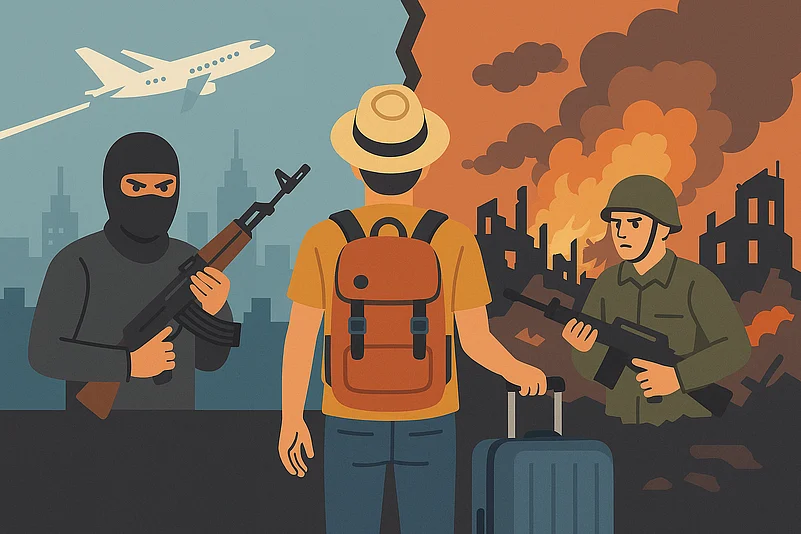Travel insurance covers terrorism risks like medical emergencies or trip cancellations.
War is excluded as it poses systemic, unpredictable, and catastrophic risks.
Terrorism is modelled using reinsurance, while war remains uninsurable in policies.
Travellers must check exclusions, sub-limits, and fine print before buying coverage.
Incorporating terrorism into coverage enables insurers to offer travel insurance policies that protect consumers financially when a medical emergency, trip cancellation, or accidental death occurs due to terrorism.
Wars or terrorist activities can affect your travel; however, there is a marked difference in how travel insurance covers both. We take a look.
Insurers keep a very clear distinction between terrorism and war in terms of the intent, scale, and actors involved. Terrorism is typically considered to be violent acts carried out by non-state actors, meant to instill fear or accomplish an ideological agenda.
“War, on the other hand, is seen as a sustained engagement between nations, states, or organized armed forces. In the case of travel insurance, this distinction is critical because terrorism is a lower-level risk, albeit unpredictable, but localized, while war is a higher-level risk that is systemic, and makes it impossible to assess risk or manage claims effectively for its varied impacts,” says Sarita Joshi, head, health and life Insurance, Probus.
Why Terrorism Is Covered In Travel Insurance
Insurers generally offer coverage for terrorism because they can model it and absorb some exposure, while using reinsurance pools and bespoke terrorism risk add-ons. Terrorist attacks, while a tragedy, occur locally and are less likely to trigger simultaneous claims across borders or groups of policyholders.
Incorporating terrorism into coverage enables insurers to offer travel insurance policies that protect consumers financially when a medical emergency, trip cancellation, or accidental death occurs due to terrorism.
But War Is Not…
“War will be excluded because it is a systemic or catastrophic risk. This is also because war is regarded as a high-risk and unpredictable event that is challenging to underwrite within standard policies; the majority of standard policies do not include death resulting from war,” says Joshi.
What To Look For
Travellers should independently confirm the exclusions section of the travel insurance policy - that is where the fine line between terrorism and war is defined. The traveller should know if terrorism is covered, what type of losses are covered (medical expenses, evacuation costs, trip cancellations, etc), and also it’s important to understand how the insurer defines war.
Travellers should also look at sub-limits, waiting periods, exclusions to trigger emergency eviction, etc. A good buyer wants to compare policies across insurers, as the wording of policies may differ. The fine print can clarify unexpected surprises at the time of claim, particularly for people travelling in areas of heightened geopolitical or security risks.










